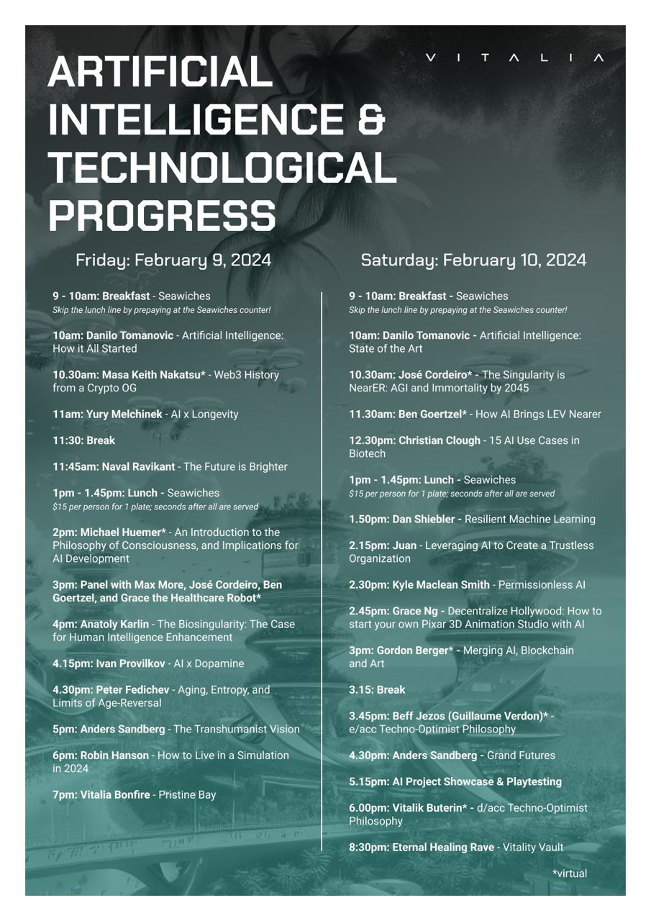
The Olympics, But With Drugs
Posted February 08, 2024
Chris Campbell
Reporting from Prospera, Honduras…
Peter Thiel’s at it again…
Not only did he help fund Próspera, the Honduran startup city I’m currently reporting from…
He’s more recently funded the “Enhanced Games” -- athletes are allowed (even ENCOURAGED) to use performance-enhancing drugs “openly and honestly.”
Anabolic steroids? Yes. Growth hormones? Yes. Testosterone Replacement Therapy? YES.
My take? For it.
Not only does it have the potential to beat out the Olympics in terms of views (and entertainment), we’ll also learn more about how the body responds to these drugs.
Knowledge is good. Especially when the participants sign up voluntarily.
AND dope-friendly Olympics will reveal things we didn’t know about biological enhancement.
Meanwhile, here in Honduras, a different type of “pro-doping” organization is forming: the BiohackerDAO.
More on that -- and how projects like BiohackerDAO are going to change the face of science -- in a moment.
Artificial Intelligence Week
Last week, Vitalia had its “Crypto and Startup Cities” conference.
This week? We’re heading into the territory of Artificial Intelligence.

Talks will cover:
The “biosingularity”, AI in biotech, decentralizing Hollywood, the techno-optimist’s philosophy, using AI to create a “trustless organization, and a lot more.
What do YOU want to learn more about from this list? Email it at feedback@altucherconfidential.com.
Since Vitalia has a big focus on longevity, there’s one idea that’s particularly strong: decentralized science, or DeSci.
The Problems With Centralized Science
The irony of centralized science is that many of the biggest breakthroughs in history didn’t happen in large institutions…
Nor were they centrally planned or even intended.
Many of them happened by individuals -- often outsiders -- trying new things and making discoveries by accident.
Fleming’s penicillin? Accident.
Röntgen’s X-Rays? Serendipitous.
Goodyear’s vulcanized rubber? A mistake!
Most are aware of the vast problems of centralized science. Not only does centralized science stifle innovation, creativity, and new discoveries…
But it also creates barriers to access and participation.
Funding and resources are concentrated in the hands of a few (rigid) institutions or individuals, making it difficult for new researchers or smaller teams to break through.
This concentration of power can lead to a narrow focus on certain research areas deemed 'profitable' or 'safe,' potentially overlooking groundbreaking ideas.
Decentralized Science: Messy is Good
Using blockchain, DAOs (decentralized LLCs), Intellectual Property NFTs (IP-NFTs), AI, crowdfunding, and a whole lot more…
Science can become cool again.
Enter DeSci, which encourages more independent research and increasing serendipities -- breakthrough’s secret sauce.
1. Open Contributions: It removes gatekeepers from the equation, allowing anyone, regardless of their institutional affiliation or geographical location, to contribute to scientific research and development.
2. Open Crowdfunding (DAOs): Through mechanisms like DAOs (Decentralized Autonomous Organizations), DeSci enables the community to fund research directly, bypassing traditional funding routes that often favor established projects. This opens the door for high-risk, high-reward research that might otherwise go unfunded.
3. IP-NFTs for Intellectual Property: This might sound like alphabet soup, but it's actually a clever way to manage and share the ownership of scientific discoveries. NFTs aren’t digital monkey pics -- they’re digital certificates on a decentralized ledger. IP-NFTs are a way to securely and transparently handle the ownership of scientific discoveries using blockchain technology.
And, here’s the thing…
It’s Already Happening
To be sure, this structure is already in use by projects like Molecule.
Molecule has $30 million in its treasury, has given out almost $2 million to biotech startups, and has over 15,000 members.
Their site also aggregates all of the DeSci projects in one place -- projects tackling everything from hair loss to cryopreservation to synthetic biology.
MoleculeDAO uses IP-NFTs and unique incubation and funding mechanisms to change the way biotech innovations are funded, developed, and shared.
By decentralizing the governance and funding of biotech projects, they aim to create a more open, collaborative, and efficient ecosystem for scientific discovery and innovation.
This could potentially accelerate the pace of biotech advancements and make them more accessible across the globe, breaking down traditional barriers associated with IP and funding.
I’m Starting a DAO
I’m going to be talking to BiohackerDAO about starting a DAO for Carbon 60 (C60) research.
If it makes sense, I’ll begin the process of creating the DAO and show you, step by step, how I did it.
Recall, yesterday I talked about the Catawba Digital Economic Zone (CDEZ).
Apart from Wyoming, it’s the only place in the States that allows you to incorporate a DAO.
(Learn more about DAO LLCs in the CDEZ right here.)
That’ll be step two.
More later.
